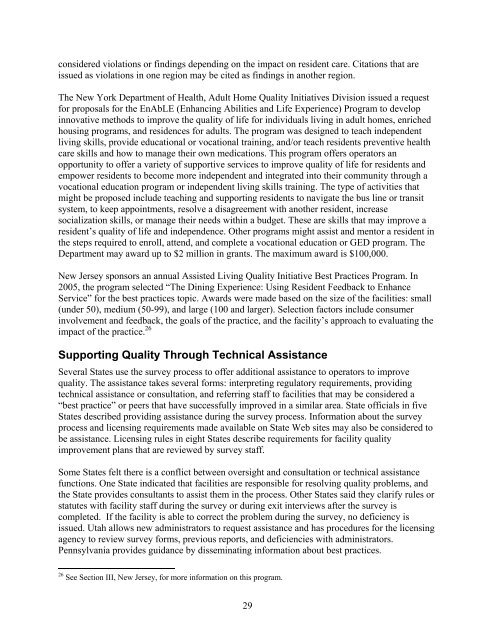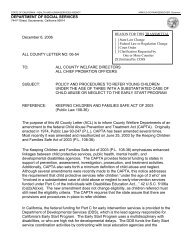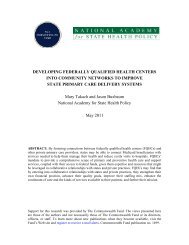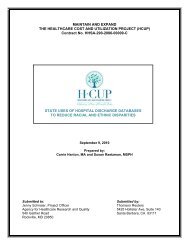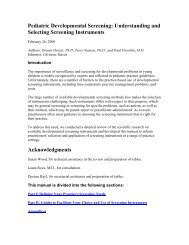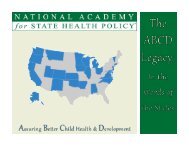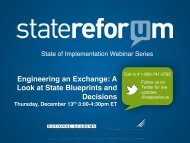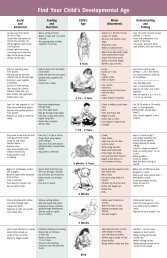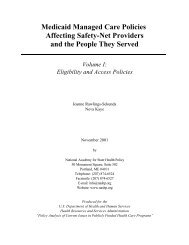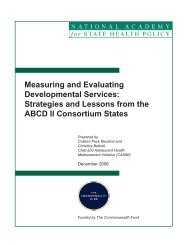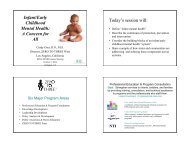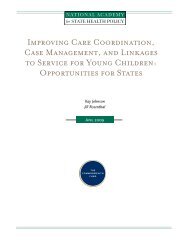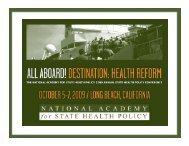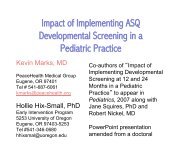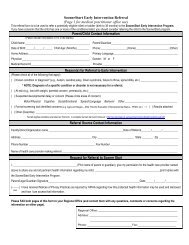Residential Care and Assisted Living - Agency for Healthcare ...
Residential Care and Assisted Living - Agency for Healthcare ...
Residential Care and Assisted Living - Agency for Healthcare ...
You also want an ePaper? Increase the reach of your titles
YUMPU automatically turns print PDFs into web optimized ePapers that Google loves.
considered violations or findings depending on the impact on resident care. Citations that are<br />
issued as violations in one region may be cited as findings in another region.<br />
The New York Department of Health, Adult Home Quality Initiatives Division issued a request<br />
<strong>for</strong> proposals <strong>for</strong> the EnAbLE (Enhancing Abilities <strong>and</strong> Life Experience) Program to develop<br />
innovative methods to improve the quality of life <strong>for</strong> individuals living in adult homes, enriched<br />
housing programs, <strong>and</strong> residences <strong>for</strong> adults. The program was designed to teach independent<br />
living skills, provide educational or vocational training, <strong>and</strong>/or teach residents preventive health<br />
care skills <strong>and</strong> how to manage their own medications. This program offers operators an<br />
opportunity to offer a variety of supportive services to improve quality of life <strong>for</strong> residents <strong>and</strong><br />
empower residents to become more independent <strong>and</strong> integrated into their community through a<br />
vocational education program or independent living skills training. The type of activities that<br />
might be proposed include teaching <strong>and</strong> supporting residents to navigate the bus line or transit<br />
system, to keep appointments, resolve a disagreement with another resident, increase<br />
socialization skills, or manage their needs within a budget. These are skills that may improve a<br />
resident’s quality of life <strong>and</strong> independence. Other programs might assist <strong>and</strong> mentor a resident in<br />
the steps required to enroll, attend, <strong>and</strong> complete a vocational education or GED program. The<br />
Department may award up to $2 million in grants. The maximum award is $100,000.<br />
New Jersey sponsors an annual <strong>Assisted</strong> <strong>Living</strong> Quality Initiative Best Practices Program. In<br />
2005, the program selected “The Dining Experience: Using Resident Feedback to Enhance<br />
Service” <strong>for</strong> the best practices topic. Awards were made based on the size of the facilities: small<br />
(under 50), medium (50-99), <strong>and</strong> large (100 <strong>and</strong> larger). Selection factors include consumer<br />
involvement <strong>and</strong> feedback, the goals of the practice, <strong>and</strong> the facility’s approach to evaluating the<br />
impact of the practice. 26<br />
Supporting Quality Through Technical Assistance<br />
Several States use the survey process to offer additional assistance to operators to improve<br />
quality. The assistance takes several <strong>for</strong>ms: interpreting regulatory requirements, providing<br />
technical assistance or consultation, <strong>and</strong> referring staff to facilities that may be considered a<br />
“best practice” or peers that have successfully improved in a similar area. State officials in five<br />
States described providing assistance during the survey process. In<strong>for</strong>mation about the survey<br />
process <strong>and</strong> licensing requirements made available on State Web sites may also be considered to<br />
be assistance. Licensing rules in eight States describe requirements <strong>for</strong> facility quality<br />
improvement plans that are reviewed by survey staff.<br />
Some States felt there is a conflict between oversight <strong>and</strong> consultation or technical assistance<br />
functions. One State indicated that facilities are responsible <strong>for</strong> resolving quality problems, <strong>and</strong><br />
the State provides consultants to assist them in the process. Other States said they clarify rules or<br />
statutes with facility staff during the survey or during exit interviews after the survey is<br />
completed. If the facility is able to correct the problem during the survey, no deficiency is<br />
issued. Utah allows new administrators to request assistance <strong>and</strong> has procedures <strong>for</strong> the licensing<br />
agency to review survey <strong>for</strong>ms, previous reports, <strong>and</strong> deficiencies with administrators.<br />
Pennsylvania provides guidance by disseminating in<strong>for</strong>mation about best practices.<br />
26 See Section III, New Jersey, <strong>for</strong> more in<strong>for</strong>mation on this program.<br />
29


